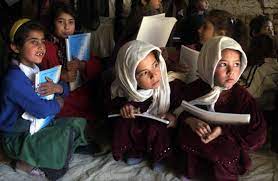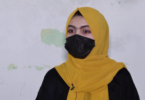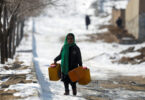KABUL (Khaama Press): Two years after the Taliban rule in Afghanistan, there is a stark contrast in opportunities between boys and girls. Boys can freely go to school, get an education, and look for well-paying jobs. However, girls must hide their schooling, can’t attend universities, and often work in low-income jobs like carpet weaving.
Gender inequalities and challenges that existed before have significantly worsened with the emergence of the Taliban. Some of these challenges, including poverty and the unemployment crisis that affects over 90% of Afghanistan’s population, have also had a profound impact on girls. They must work strenuously to support their families, exacerbating their hardships.
Nadia, a mother of four daughters, used to encourage her daughters to pursue education and dream of a better future despite economic challenges. However, with the ban on girls’ education and the closure of girls’ schools under the rule of the Taliban administration, her hopes for her daughter’s future have been shattered.
The stories of mothers and daughters in Afghanistan, despite their desires for their daughters to experience different destinies, are becoming increasingly similar with each passing day. Twenty years ago, Nadia and her family migrated to Pakistan during the Taliban rule. There, like most Afghan refugees, she started working in carpet weaving to make ends meet. She was a teenager but learned carpet weaving to help support her family.
Nadia later married in Pakistan and, in recent years, returned to Afghanistan so that her daughters could receive an education, study, and have better income opportunities. However, she never imagined that her daughters would follow a path she had taken out of necessity.
Marwa, Nadia’s second daughter, was in ninth grade when the Taliban took control, and girls’ schools were closed. Marwa says economic difficulties and the lack of educational opportunities have forced her into carpet weaving. She spends her days weaving carpets, a job she’s doing at an age when her mother was doing the same.
According to Nadia, “People with good economic conditions can have online businesses and study online, but most people in Afghanistan do not have a good economy and cannot even afford to eat properly, especially when men are also unemployed, let alone online education.”
Nilofer, a 16-year-old girl deprived of education, bears the burden of her family’s economic hardships. She says, “I work nine hours daily and earn five thousand Afghanis. It’s not a lot of money, and my family and I struggle to make ends meet.”
When Nilofer goes to the carpet weaving workshop, she doesn’t feel alone because, as she puts it, “Every day, I see other girls in the workshop who face the same problems as me. They are deprived of education, their families are impoverished, and now they are weaving carpets.”
She says, “This is the story of all girls in Afghanistan.”







